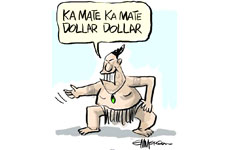I was reluctant to post while I had the chance on ANZAC day, since there was such a good debate going on, and now I’ve (temporarily) run out of time again. So just a few quick observations.
- Phil Goff’s one-two punch on the top tax rate and Auckland governance is solid, and both are good orthodox Labour positions for him to take. But it’s more of the same: lacking verve and failing to get cut-through as a consequence. I mean to post on the positioning of the taxation pledge at some stage, but in case I don’t get to: this is a good opportunity for Goff to demonstrate compromise as well as differentiate himself, by coupling a reimplementation of the top rate with an increase of the threshold.
- Even without Sunday’s tragic helicopter crash, Goff’s timing was poor in making these two announcements before ANZAC Day. I guess you take the opportunities you can get, but delaying things by a week would have been more useful in my view.
- As an aside, my mum knew the three late airmen vaguely through Search and Rescue, and confirms the universal sentiment that they were of the very best sort. I’m pleasantly surprised that the crash hasn’t turned into a witchhunt about why we’re still using Vietnam-era hardware; as true as the sentiment might be, we can all do without people thundering “if we’re going to have a military, we owe it to our troops to have it decently-outfitted” under circumstances such as these. Such is the power of ANZAC day, I suppose.
- On a related point, the discipline with which the military, government, police and media have adopted the Air Force’s framing terminology in this event is remarkable. All four groups are talking about “the Air Force family” and exploiting the metaphor for all it’s worth. Those words are used almost every time one of these people stands in front of a microphone, and in addition the three deceased are “brothers”; Mark Sainsbury reported live last night from the family’s “lounge”, the squad room at Ohakea air base; all four have referred to the Iroquois as being like “your grandfather’s axe” — the reference being that, although it’s very old, when the handle is worn it gets replaced, and when the head is worn it gets replaced, so while it’s his axe in spirit, it actually contains no parts of the original tool and is as good as new in function. On the one hand, this is compelling symbolic stuff: nobody who deviates from this framing can really be said to be showing the proper sort of respect and deference; on the other hand, it’s a bit creepy for everyone to be falling into lockstep behind Defence HQ communications. There are ways of saying these things without using the exact same words, and the constant repetition spooks me. Maybe I’m just sensitive. [Edit: There was a clean sweep for “Air Force family” or something similar in speeches supporting the Prime Minister’s parliamentary motion of condolence. No shock there, I suppose.]
- On a somewhat lighter note, Councillor Tony Jack has picked the wrong district council to put a motion banning macrons in council materials. This is the KÄpiti Coast District Council, who moved to put the macrons into PaekÄkÄriki and ÅŒtaki only a month ago. Jack’s motion was voted down, at which point he predictably declared that PC had gone mad. Bless. Of course, the Stuff article doesn’t contain the macrons, so I guess he wins as far as that goes.
- Tim Watkin at Pundit continues to write excellent sense and ask smart questions about race relations in Aotearoa New Zealand. I think the emphasis in Tim’s piece is just right — there is a legitimate claim to indigeneity for non-MÄori, but it’s not so obvious as Trevor Mallard’s “I was born in Wainuiomata”, and there’s a lot to work out before such definitions can be settled upoin comfortably. I’m all for having this discussion. I particularly like the ornithological allegory drawn by commenter “william blake” — we are all PÅ«keko!
- Also on a lighter note, a (very) atheist friend whose six year-old daughter has chosen to go to Bible study classes recently asked him if, because Jesus had risen from the dead, that meant he was a zombie. It apparently took every ounce of his parental commitment to letting his girl make up her own mind to explain the origins of zombie stories, how myths come about, etc. rather than just saying, yes, Jesus is a zombie. Good on him — not sure I would have had the fortitude.
- Speaking of things biblical, and of belonging, Joanna Newsom has a new album out, and here’s the first single — about tilling one’s own bit of the Garden of Eden:
Ok, so not so brief after all. Discuss. I’ll dive back in as I can. You can treat this as an open thread as well: post what you want to talk about.
L

